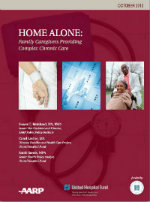 View a PDF of the full report.
View a PDF of the full report.Who cares for our ill, our aged, our vulnerable? Is it physicians, nurses, social workers, aides? Or is it perhaps another member of the health care team? The largest portion of health care is delivered by families.
Whether it is taking mom to the doctor, preparing meals, or picking up prescriptions, the 42 million family caregivers in the United States provided care valued at $450 billion in 2009, more than our total annual Medicare expenditure in that same year. They provide a lot of care. They keep our frail and complex elders at home.
But we now know that families are not just doing the unskilled tasks I described to support the ones they love. They are in fact struggling with highly skilled care—care that is normally provided by trained doctors and nurses.
Welcome to the John A. Hartford Foundation's caregiver reality check.
The AARP Public Policy Institute, in partnership with United Hospital Fund, recently released a report, Home Alone: Family Caregivers Providing Complex Chronic Care funded by The John A. Hartford Foundation. The report outlines the results of the first nationally representative population-based online survey of 1,677 family caregivers to determine what medical/nursing tasks they perform.
In an age when people are discharged from hospitals with higher acuity, or not admitted at all, it is no surprise to see what healthcare delivery rests at the feet of today's family caregivers. Here are a few of the findings:
• Almost half (46 percent) of family caregivers performed medical/nursing tasks for care recipients with multiple chronic physical and cognitive conditions.
• Three out of four (78 percent) family caregivers who provided medical/nursing tasks were managing medications, including administering intravenous fluids and injections.
• Caregivers often felt unprepared. Wound care was cited as particularly challenging, with more than a third of family caregivers (38 percent) wanting more training. Yet families provided this complex care, despite the challenges, because they believed that providing this care would help their family members avoid institutionalization.
Home Alone: Family Caregivers Providing Complex Chronic Care is a call to action with recommendations to better meet the needs of families caring for our nation's older adults. It is not sufficient to honor family caregivers. We need to ensure that they are supported and valued.
I urge you to look at the role of today's caregiver. One day it will be you. Perhaps it already is. It is time to take up the gauntlet in support of families in meaningful ways. As providers, we are not just caring for a patient. In policy, we need to understand that the family is the new unit of care.
Reality? Check!
